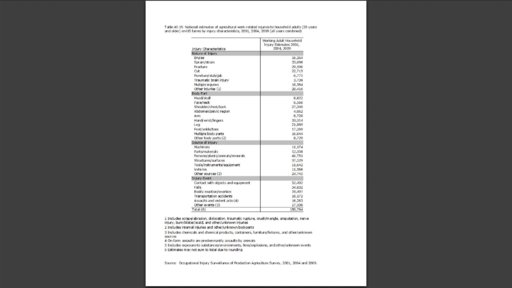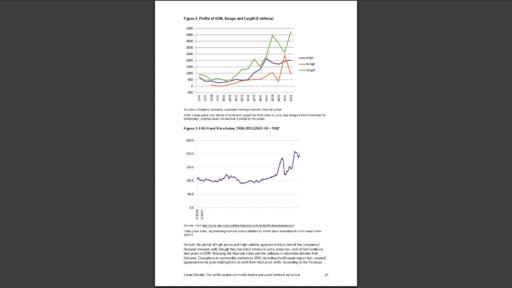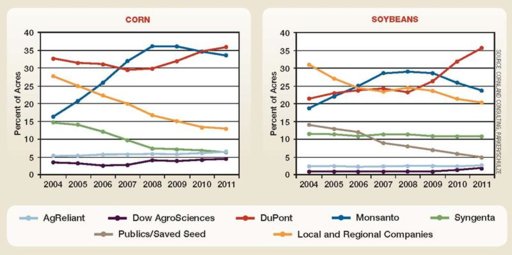Seems there's plenty here who've not done due diligence on the subject, O. Plus ca change, eh?
Just a little taster on how Monsanto threaten and harass any dissenters; anyone daring to point out the dire consequences of using their products.
There's a great Canadian documentary called The World According to Monsanto. If you've not seen it, it's a must watch. In it, you'll meet former EPA and FDA scientists; scientists formerly working on research; independent scientists and researchers. The film effectively documents how Monsanto put its own employees into positions at the EPA and FDA in order to push through non regulation. Ie., as a result of their efforts, there are no GM specific safety checks and balances; the existing legislation for conventional agriculture practice was upheld as the standard. Tests showing potential problems, such as pre-cancerous cells developing in lab animals were swept under the carpet and the products were rushed into the market - corporate profit above all else. You'll also get a potted history of Monsanto which speaks for itself.
Michael Taylor is a character you'll meet in the film. A Monsanto lawyer/employee who took up a position in the FDA to help with all that non-regulation. More recently, Obama appointed him to the position of Food Safety Czar.
Thankfully there are people who do care, O. Compassion in World Farming is a good org; but for me the issue isn't just the abomination of power and profit seeking GM pushers like Monsanto (though it's a big one), it's the globalisation and industrialisation of the whole agri business. It's completely unsustainable - most of the world's soil is exhausted of minerals due to intensive farming of crops; the very act of cropping is the act of removing nutrients from the soil without any replenishment. This permanent state of decline leads to necessary annual additions of man-made organo phosphates, just to keep up. It's soil suicide.
Check out Mark Shepard, O - if you're interested in viable alternatives. Mark runs his farm in Wisconsin (if I remember right) along the lines of what he terms Restoration Agriculture, a permaculture based design and error lead system which aims to use many more perennial crops (trees mainly) plus layering crops from tree canopy to ground, increasing the harvest of sunlight and soil on one acre to an optimal 5-6 acres in one (beats chucking a hard grain on the floor and that's your lot), and through that returning the environment to a savannah type, where the livestock can forage and feast on many plant varieties. Mark's system is economically viable and regenerates the soil to a rich, nutrient packed deep loveliness in no time flat. You can find a talk by him on YT - about two and a half hours - for a good overview of what's what. I recommend it.
Just a little taster on how Monsanto threaten and harass any dissenters; anyone daring to point out the dire consequences of using their products.
There's a great Canadian documentary called The World According to Monsanto. If you've not seen it, it's a must watch. In it, you'll meet former EPA and FDA scientists; scientists formerly working on research; independent scientists and researchers. The film effectively documents how Monsanto put its own employees into positions at the EPA and FDA in order to push through non regulation. Ie., as a result of their efforts, there are no GM specific safety checks and balances; the existing legislation for conventional agriculture practice was upheld as the standard. Tests showing potential problems, such as pre-cancerous cells developing in lab animals were swept under the carpet and the products were rushed into the market - corporate profit above all else. You'll also get a potted history of Monsanto which speaks for itself.
Michael Taylor is a character you'll meet in the film. A Monsanto lawyer/employee who took up a position in the FDA to help with all that non-regulation. More recently, Obama appointed him to the position of Food Safety Czar.
Thankfully there are people who do care, O. Compassion in World Farming is a good org; but for me the issue isn't just the abomination of power and profit seeking GM pushers like Monsanto (though it's a big one), it's the globalisation and industrialisation of the whole agri business. It's completely unsustainable - most of the world's soil is exhausted of minerals due to intensive farming of crops; the very act of cropping is the act of removing nutrients from the soil without any replenishment. This permanent state of decline leads to necessary annual additions of man-made organo phosphates, just to keep up. It's soil suicide.
Check out Mark Shepard, O - if you're interested in viable alternatives. Mark runs his farm in Wisconsin (if I remember right) along the lines of what he terms Restoration Agriculture, a permaculture based design and error lead system which aims to use many more perennial crops (trees mainly) plus layering crops from tree canopy to ground, increasing the harvest of sunlight and soil on one acre to an optimal 5-6 acres in one (beats chucking a hard grain on the floor and that's your lot), and through that returning the environment to a savannah type, where the livestock can forage and feast on many plant varieties. Mark's system is economically viable and regenerates the soil to a rich, nutrient packed deep loveliness in no time flat. You can find a talk by him on YT - about two and a half hours - for a good overview of what's what. I recommend it.



